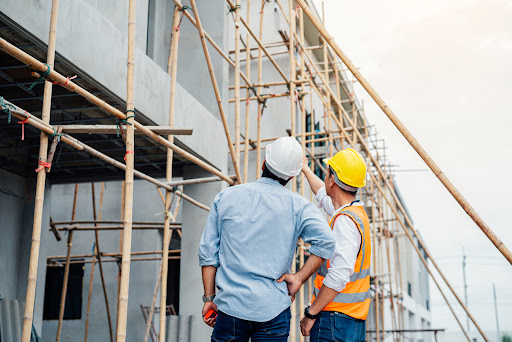An Aurora construction accident attorney with Horwitz, Horwitz & Associates is here for you if you’ve suffered an injury and fear you won’t receive total and fair compensation through workers’ compensation. Each case is unique, so we’ll help you decide which route is best for you: filing a claim through workers’ compensation or seeking compensation through a personal injury lawsuit.
You can schedule a free case evaluation with one of our Aurora personal injury attorneys by contacting us online or giving us a call at (800) 985-1819.
What are employer and employee responsibilities when preventing construction injuries?
Employers are responsible for providing a safe working environment for their employees and complying with OSHA regulations. This includes:
- Conducting regular safety inspections and audits to identify and address hazards.
- Providing appropriate training and education for employees on safe work practices and the use of equipment and tools.
- Provide personal protective equipment and ensure that it is properly maintained and used.
- Establishing emergency procedures and providing first aid equipment and personnel.
- Maintaining equipment and machinery in safe working condition and ensuring proper use.
- Communicating any potential hazards to employees and providing instructions on how to work safely.
- Investing in safety programs and promoting a culture of safety in the workplace.
Employees also have a responsibility to take safety precautions and follow safety procedures. This includes:
- Attending safety training and education sessions provided by the employer.
- Following safe work practices and procedures.
- Using personal protective equipment as directed by the employer.
- Reporting any hazards or unsafe conditions to the employer immediately.
- Notifying the employer of any injuries or illnesses sustained on the job.
- Following emergency procedures and knowing emergency exits
- Being aware of the surroundings and potential hazards on the construction site.
By working together and following safety guidelines, employers and employees can help prevent construction injuries and create a safer working environment.
What are common types of construction accident injuries?
- Fractures from falls or being struck by heavy equipment.
- Head injuries as a result of falling or being struck by falling objects.
- Lacerations from coming into contact with sharp edges or tools.
- Burns from electrical hazards, fires, or coming into contact with hot equipment.
- Crush injuries from heavy machinery or collapses.
- Amputations due to machinery accidents or other types of accidents.
- Back and spinal cord injuries from falls, heavy lifting, or other accidents.
- Illnesses related to exposure to hazardous materials such as asbestos or lead.
- Repetitive motion injuries include carpal tunnel syndrome, tendinitis, or stress injuries from lifting heavy objects or carrying materials.
What are the common causes of construction injuries?
- Falls
- Electrical hazards
- Heavy machinery accidents
- Stress injuries
- Trench collapse
- Vehicle accidents
What are the OSHA and worker safety regulations?
Occupational Safety and Health Administration (OSHA) is a federal agency that enforces safety and health regulations in the workplace. OSHA sets standards and regulations to protect workers from hazards that can cause severe injury or death. These regulations cover a wide range of industries, including construction.
Construction companies are required to comply with OSHA regulations, which cover a wide range of safety issues, including:
- Fall protection – Employers must provide fall protection for workers working at heights, such as on scaffolding or rooftops.
- Electrical safety – They must also ensure that electrical equipment and wiring are correctly maintained and that workers are trained in electrical safety.
- Heavy machinery safety – Employers must ensure that heavy machinery is adequately maintained and that workers are trained to operate it safely.
- Hazard communication – Employers must inform workers about the hazards of the materials they are working with and provide appropriate protective equipment.
- Personal protective equipment – Employers must provide workers with appropriate personal protective equipment, such as hard hats, safety glasses, and earplugs.
- First aid – Employers must provide a first aid kit and trained first aid personnel on-site.
- Trench safety – Employers must provide cave-in protection and ensure workers receive training in trench safety.
- Vehicle safety – Employers must provide appropriate safety measures for vehicles operating on construction sites.
OSHA also provides resources for employers and employees to help them understand and comply with the regulations, including training materials and guides. Companies that violate OSHA regulations may face penalties and fines.
What is the workers’ compensation claims process?
In Illinois, the workers’ compensation claims process is as follows:
- Report the injury – The employee must report the injury to the employer as soon as possible. The employee must report the injury within 45 days of the injury or from the date when the employee knew or should have known that the injury was work-related.
- Employer reports the injury – The employer must file a report with the Illinois Workers’ Compensation Commission (IWCC) within 14 days if you’ve missed three or more work days due to your injury.
- The employee receives medical treatment –The employer must provide the employee with a list of authorized treating physicians within 14 days of receiving notice of the injury.
- Employee files a claim – The employee must file a claim for benefits with the Illinois Workers’ Compensation Commission within three years of the date of injury.
- Medical examination – The employee may be required to undergo a medical examination to determine the extent of the injury.
- The claim is reviewed – The IWCC will review the claim and decide on benefits.
- Payment of benefits – If the claim is approved, the employer’s insurance carrier will begin paying benefits to the employee, which may include lost wages, medical expenses, and vocational rehabilitation.
- Appeals – The employee can appeal the decision if the claim is denied.
The process can vary depending on the case’s specific circumstances, and it may take several weeks or months for a final decision to be made. You’ll need to keep track of the medical expenses, lost wages, and other expenses related to the injury.
Are there time limits for filing a claim?
If you’re filing a claim through workers’ compensation, you have three years from the date of injury or illness to file a claim with the Illinois Workers’ Compensation Commission (IWCC) if you haven’t received any compensation or benefits from your injury. If you’ve received any benefits or compensation, then you must file your claim with the IWCC within two years of the date you last received compensation.
If your Horwitz, Horwitz & Associates Aurora construction accident attorney recommends that you have greater chances of recovering damages through a personal injury lawsuit, then the deadline or statute of limitations by which you must file your claim is two years from the date of the accident. If you don’t file a claim within these two years, you’ll likely be barred from pursuing legal action for your injuries or losses.
It’s always better to file a claim as soon as possible after an accident, as evidence may be more complex to gather, and memories may fade over time. In some cases, the employer or insurance company may contest the claim. The sooner you file your claim, the better your chances are of winning the case.
What type of benefits are available after my construction accident?
After a construction accident, you may be entitled to various benefits through the workers’ compensation system. These benefits may include the following:
- Medical expenses – These include doctor’s visits, hospital stays, surgery, prescription medications, and physical therapy.
- Lost wages – You could be entitled to receive compensation for wages lost while you can’t work due to your injuries.
- Permanent disability – If you’re permanently disabled due to the accident, you may be entitled to additional benefits for the rest of your life.
- Vocational rehabilitation – You might be entitled to receive assistance with returning to work, such as job training or education.
The amount and duration of benefits will depend on the specific circumstances of your case, such as the severity of the injuries, your ability to return to work, and the availability of vocational rehabilitation services. An experienced Aurora construction accident attorney can help you understand the benefits you may be entitled to and ensure that you receive fair compensation.
Do I have the right to file a personal injury lawsuit?
If insurance denies your workers’ compensation claim, or you feel you’re not getting the benefits you deserve, you should speak with an Aurora construction accident attorney because you may be eligible to recover compensation through a personal injury lawsuit if the statute of limitations hasn’t expired.
For example, if your employer may have claimed that you were responsible for the accident or otherwise tried to deny the benefits that are rightfully owed to you, an attorney can investigate what happened and who was at fault.
There are other instances where a third party might have contributed to the accident, such as the manufacturer of a defective part or piece of machinery. You might be able to seek damages in a personal injury lawsuit against the manufacturer.
Resources for assistance and further information
There are several resources available in Illinois for individuals who have been involved in a construction accident:
- The Illinois Workers’ Compensation Commission – This state agency administers the workers’ compensation system in Illinois and can provide information on the claims process, benefits, and appeals.
- OSHA – OSHA can provide information on safety standards and regulations and conduct investigations into workplace accidents.
- Illinois Department of Public Health – This state agency provides resources and information for workers who may have suffered exposure to hazardous materials. They also provide resources for employers and employees to understand the regulations and reporting process.
Why work with an Aurora construction accident attorney from Horwitz, Horwitz & Associates?
The Aurora personal injury attorneys with Horwitz, Horwitz & Associates can investigate the accident, gather evidence, and interview witnesses, all of which can be critical in proving negligence in a personal injury lawsuit or for recovering maximum benefits through a workers’ compensation claim.
We can also negotiate with the employer or insurance company to ensure you receive fair compensation for your injuries and losses. Don’t wait — call (800) 985-1819 or contact us online for a free consultation.


















